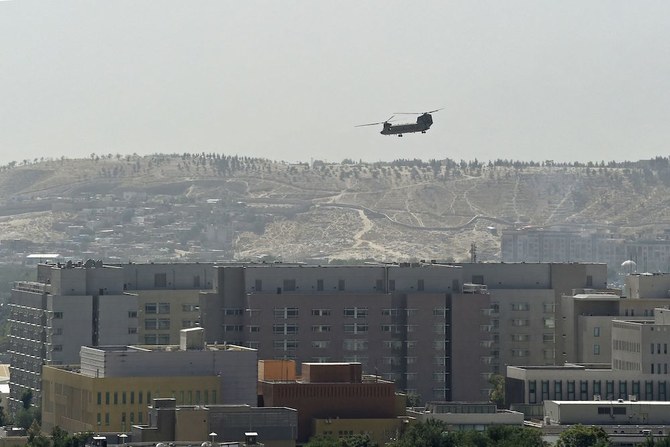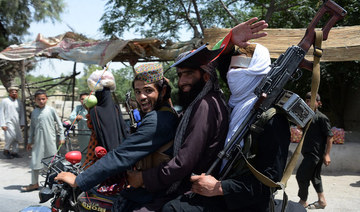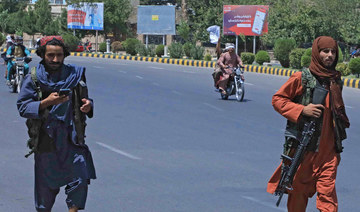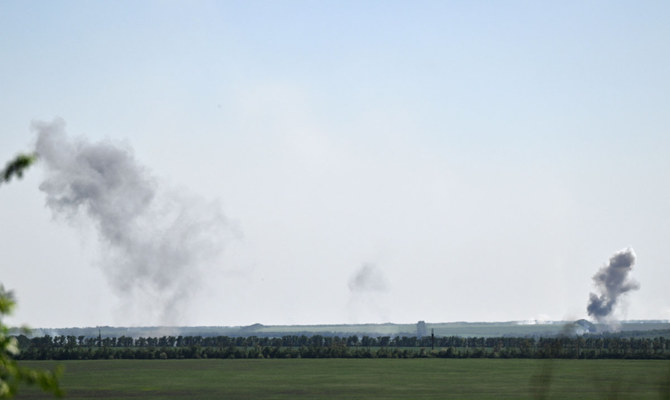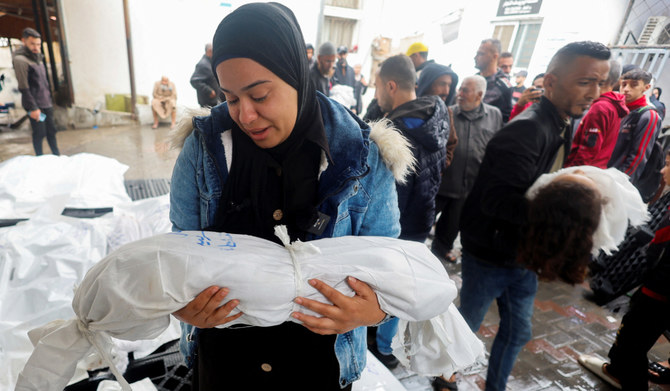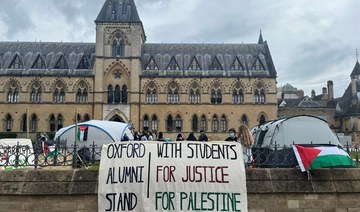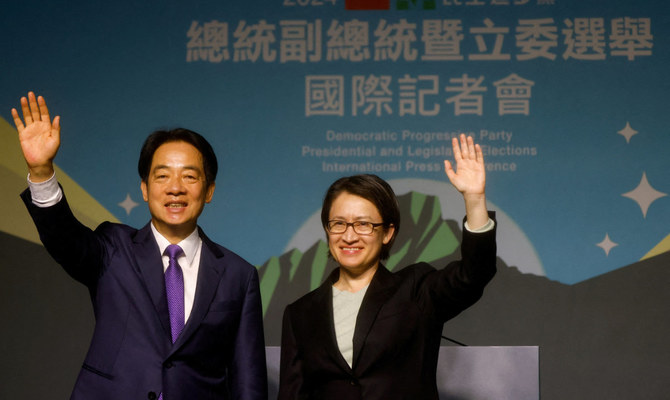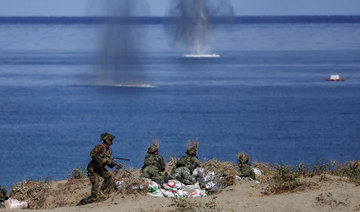KABUL: The president of Afghanistan, Ashraf Ghani, fled Kabul on Sunday as Afghans and foreign embassy staff rushed to leave the capital after the Taliban said it would enter the city.
Taliban fighters made dramatic gains on Sunday, entering the outskirts of the capital, Kabul, as the US deployed troops to evacuate thousands of people, government officials said.
Abdullah Abdullah, the head of the Afghan National Reconciliation Council, said Ghani had left and blamed him for the country’s situation.
US Secretary of State Antony Blinken rejected comparisons to the America’s withdrawal from Vietnam as helicopters flew in and out of the US compound in Kabul. He said embassy staff in Kabul were leaving the compound and heading to the airport.
Zabihullah Mujahid, a Taliban spokesman, said the militants had ordered its fighters to enter the Afghan capital Kabul to prevent looting after local police deserted their posts.
Earlier, Mujahid said the Taliban had no intention of “entering Kabul by force or war, but is holding talks with the other side for a peaceful entrance to Kabul.”
He did not explain who the “other side was” but assured Afghans that “life, honor and property of people will be protected”, before ordering the Taliban to “remain at the gates of Kabul and avoid revenge.”
Acting interior minister Abdul Sattar Mirzakawal, in a video message confirmed talks on formation of a transitional government, said: “The people of Kabul should not worry, the city is secure. Whoever causes disorder will be dealt with decisively.
The security of the city is guaranteed, the city will not be attacked.... and the deal is to transfer power peacefully to the leadership of a transitional administration inshallah... Kabul is safe, be assured,” he said in a recorded speech.
An Afghan official said forces at Bagram air base, home to a prison housing 5,000 inmates, have surrendered to the Taliban.
Bagram district chief Darwaish Raufi said Sunday that the surrender handed the one-time American base over to the insurgents.
The prison housed both Taliban and Daesh fighters.
The last pockets of resistance in the major city of Mazar-i-Sharif fell to the Taliban overnight. By Sunday, the group had seized the key city of Jalalabad in the east and the adjacent areas of Laghman and Maidan Wardak some 20 kilometers to the west of Kabul, they said.
With the latest victories, since a surge in attacks over a week ago, the Taliban controls all key border crossings with neighboring countries. Besides Kabul, they have seized all major cities and several airports in Afghanistan.
The conquests appear to have delivered a final blow to President Ghani’s diminishing powers as the remaining US-led foreign troops aimed to withdraw by Aug. 31.
In the face of the Taliban’s gains and fear of deteriorating security, US troops on Saturday evening arrived in Kabul to evacuate thousands of people, including embassy staff, Afghan employees and their families, according to media reports.
“The government is now confined only to Kabul, and few other provinces which are vulnerable to Taliban attacks or authorities there too may surrender to the Taliban like some other provinces,” Taj Mohammad, a Kabul based analyst, told Arab News.
“The fall of towns and cities happen in a very dramatic way, and who knows how soon other areas, including Kabul, will fall,” he added.
Besides Mazar-i-Sharif, several provincial capitals fell to the insurgent group without much resistance.
The head of government-appointed public uprising forces, Ustad Atta Mohammad, said that the city, close to the border with Uzbekistan, was taken over through “a plot”, but he did not say who was behind it.
Atta and other regional commanders, including Gen. Abdul Rashid Dostum, are believed to have fled to Uzbekistan, like the 1998 take of Mazar by the Taliban.
Authorities have refused to explain the Taliban’s sweeping gains since US-led troops began their departure on May 1.
In a televised address to the nation on Saturday, Ghani said he was “aware of public’s concern about their future” and vowed to focus on preventing “further violence and instability” without elaborating on details.
The president, who had been under fire to quit power, said his top priority would be “remobilizing security and defense forces” after consultation with national leaders and the international community.
“In the speech, Ghani opened the door to another speech where the real news will be announced. So, stayed tuned for Kabul President’s next speech,” Torek Farhadi, an adviser for the former government, told a local TV channel.
Since last week, US Secretary of State Antony Blinken has discussed the security situation twice with Ghani.
US officials said Blinken’s latest phone call focused on discussions over “the current security situation as well as our urgent diplomatic and political efforts to reduce violence.”
While the Taliban gains ground, the US has not stopped its efforts to broker a deal in Doha, Qatar, between Taliban and government-appointed negotiators.
Major powers such as the US and Britain have warned the Taliban against a military takeover but argue a complete Taliban takeover was not “inevitable.”
UN Secretary-General António Guterres has said he is “deeply disturbed” by accounts of poor treatment of women in areas seized by the Taliban, who imposed an ultra-austere brand of Islam on Afghanistan during their rule from 1996 to 2001.
“It is particularly horrifying and heartbreaking to see reports of the hard-won rights of Afghan girls and women being ripped away,” Guterres said.
The scale and speed of the Taliban’s advances have shocked Afghans and the US-led alliance that poured billions into the country after toppling the Taliban in the wake of the September 11 attacks nearly 20 years ago.
“People think like other parts of the country, the Taliban will take Kabul too because morale is low among troops, people are tired of war and the soldiers not willing to sacrifice their lives for the corrupt leaders of Kabul,” retired colonel Mohammad Hassan, who serves as a security analyst, told Arab News.
– With agencies




